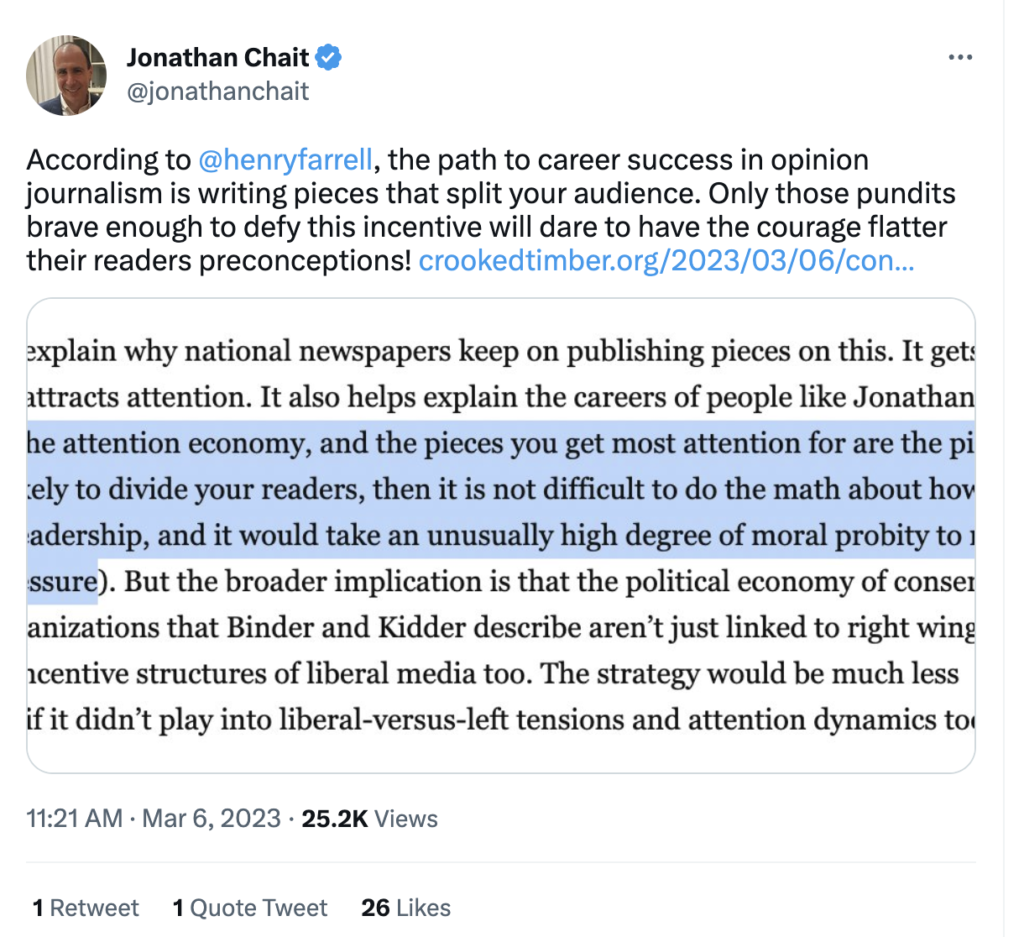Since I’m on the topic of Max Weber, religion and technology already, here’s a half-developed theory of Elon Musk that I’ve been nurturing for a while. I’ve trotted it out informally at a couple of meetings, and I’m not completely convinced it is right, but it’s prima facie plausible, and I’ve gotten some entertainment from it. My argument is that Musk is doing such a terrible job as Twitter CEO because he is a cult leader trying to manage a church hierarchy. Relatedly – one of SV’s culture problems right now is that it has a lot of cult leaders who hate the dull routinization of everyday life, and desperately want to return to the age of charisma. [click to continue…]
Posts by author:
Henry
Erin Kissane wrote a great essay on the differences between Mastodon and Bluesky (two very different decentralized social networks/Twitter alternatives). Read it! I too joined Bluesky a few days ago (no – I don’t have any invites), and I’ve some of the same impressions as she did, but not being a real tech person, I want to talk more about the social differences between the two social media networks [click to continue…]
I’ve just finished reading Cory Doctorow’s great, fun novel, Red Team Blues, and I’ve been thinking about how well it exemplifies one of the strengths of good science fiction. Back when we ran our seminar on Francis Spufford’s novel, Red Plenty, there was a back-and-forth between Francis and Felix Gilman. As Francis described it post-hoc, he wanted to write the novel of the socialist calculation debate, in part because of the challenge:
I was positively attracted to the whole business of being the first person in thirteen years to consult Cambridge University Library’s volumes of The Current Digest of the Soviet Press; and in general to the challenge of taking on the most outrageously boring subject matter I could find, and wrestling it to the floor, and forcing it to disgorge its hidden jewel of interestingness
This post is a memo that I just presented at a workshop organized at the EUI by Kate McNamara, Frederic Merand and Catherine Hoeffler. Some of its key ideas were articulated in an informal discussion with Bill Janeway, Margaret Levi, Suresh Naidu, Dani Rodrik and Gabriel Zucman a couple of weeks back. None of them are at all to blame (I’ve benefited greatly from their various comments, suggestions and disagreements but probably not nearly so much as I should have).
Memo
In this brief and very informal memo, I argue that the “knowledge problem” critique of industrial policy has itself become a problem for knowledge. For decades, economists have argued that state policy makers lack the requisite knowledge to intervene appropriately in the economy. Accordingly, decisions over investments and innovation ought be taken by market actors. Now, the “market knows best” paradigm is in disrepair. It isn’t just that “hyperglobalization” has devoured its own preconditions, so that it is increasingly unsustainable. It is also that some goals of modern industrial policy are in principle impossible to solve through purely market mechanisms. To the extent, for example, that economics and national security have become interwoven, investment and innovation decisions involve tradeoffs that market actors are poorly equipped to resolve. There are good reasons why Adam Smith did not want to see defense policy handled through the market’s division of labor. [click to continue…]
Attention conservation notice: short but entirely speculative exercise in amateur sociology/game theory, by someone who has no professional license to do either, and had a blue tick for a couple of years but was always bemused as to why.

A quick note as to what went wrong with the Elon Musk strategy of giving power to the peasants. My take is that the Tyler Cowen case that “Elon is already ahead of the critics on this one, and was all along” was wrong, and that the politics of online aristocracy aren’t nearly what Musk thought they were. [click to continue…]
Hugo Mercier, Melissa Schwartzberg and I have two closely related publications on what we’ve been calling “No-Bullshit Democracy.” One is aimed at academics – it’s a very short piece that has just been officially published in American Political Science Review. The other just came out in Democracy. It’s aimed at a broader audience, and is undoubtedly livelier. An excerpt of the Democracy piece follows – if you want to read it, click on this link. The APSR academic letter (which can be republished under a Creative Commons license) is under the fold. Which one you might want to read depends on whether you value footnotes more than fisticuffs, or vice versa …
The New Libertarian Elitists
What might be called “no-bullshit democracy” would be a new way of structuring democratic disagreement that would use human argumentativeness as a rapid-growth fertilizer. … But first we need to sluice away the bullshit that is being liberally spread around by anti-democratic thinkers. … . Experts, including Brennan and Caplan (and for that matter ourselves), can be at least as enthusiastic as ordinary citizens to grab at ideologically convenient factoids and ignore or explain away inconvenient evidence. That, unfortunately, is why Brennan and Caplan’s books do a better job displaying the faults of human reasoning than explaining them.
[attention conservation notice: this post consists of lengthy opinionating with a smattering of thinly sketched arguments from psychological research, and a now-obscure science fiction novel. Also – if you really disliked M Night Shyamalan movies, even before the shtick became a shtick, you’re likely to be annoyed].
So Jonathan Chait wasn’t happy with the side-comment on his career incentives in my last post (see the tweet pictured above). Fair enough. But his alternative theory of how the attention economy works is one dimensional and self-flattering (which is not to say that it is entirely wrong). [click to continue…]
There’s been a lot of grumpy commentary about this recent NYT op-ed by Adam S. Hoffman, a Princeton senior claiming that conservatives are being driven off campus. Its basic claims:
In the not-so-distant past, the Typical College Republican idolized Ronald Reagan, fretted about the national debt and read Edmund Burke. Political sophistication, to that person, implied belief in the status quo. … Today’s campus conservatives embrace a less moderate, complacent and institutional approach to politics. … many tend toward scorched-earth politics. But these changes aren’t solely the consequence of a fractured national politics.They’re also the result of puritanically progressive campuses that alienate conservative students from their liberal peers and college as a whole.
The story of this transformation, according to the social psychologist Jonathan Haidt, starts around 2014, when Gen Z arrived on campus. The new progressive students were less tolerant of heterodox ideas and individuals. …For those on the right, the experience is alienating. … And those who challenge liberal pieties can face real repercussions.
[the below is the main text of Henry Farrell and Marion Fourcade, “The Moral Economy of High-Tech Modernism,” published in the Winter 2023 issue of Daedalus under a Creative Commons license. For the original in HTML form, click here, and for a nicely formatted PDF, click here.]
Abstract
While people in and around the tech industry debate whether algorithms are political at all, social scientists take the politics as a given, asking instead how this politics unfolds: how algorithms concretely govern. What we call “high-tech modernism”—the application of machine learning algorithms to organize our social, economic, and political life—has a dual logic. On the one hand, like traditional bureaucracy, it is an engine of classification, even if it categorizes people and things very differently. On the other, like the market, it provides a means of self-adjusting allocation, though its feedback loops work differently from the price system. Perhaps the most important consequence of high-tech modernism for the contemporary moral political economy is how it weaves hierarchy and data-gathering into the warp and woof of everyday life, replacing visible feedback loops with invisible ones, and suggesting that highly mediated outcomes are in fact the unmediated expression of people’s own true wishes.
[click to continue…]
[attention conservation notice: I am neither a philosopher nor a cognitive scientist]
A quick friendly-critical response to this piece by Liam Kofi Bright, which also plugs some of my own collaborative work with Hugo Mercier and Melissa Schwartzberg.
The short version – many arguments against the human capacity for reason rest on shaky empirics, as Liam argues. But Liam’s counter-claim – that human beings are individually good at reasoning – isn’t necessary to make the case that I think he wants to make.
Even if human beings are bad at (some forms) of individual reasoning, they may be able to reason quite well collectively. That provides a different set of grounds for optimism about human reasoning that is maybe less congenial for analytic philosophy (I’ve no idea how you would begin to model it formally – perhaps others do) but that is robust against possible empirical criticisms that the usual analytic philosophy arguments are not. [click to continue…]
Ruthanna Emrys’ new novel, A Half-Built Garden is out (Indybound, Amazon). If you want to know whether you should buy it, the answer is yes, if you like sociologically and politically sophisticated sf, if you are looking for a realistic but hopeful take on a post-climate change future, if you want a different kind of first contact story, or any combination of the above. If you’re looking for a proper review, go here.
This post does something quite different – it singles out just one of the political threads from the novel. In other words – read the book too or first to get the bigger narrative that gives it proper context. I do try to avoid big spoilers, but I can’t help giving some sense of the book’s background.
Short version: A Half-Built Garden thinks through the relationship between AI/machine learning and democracy from a very different perspective than our current one. It asks a question that very few people are asking, but that is plausibly pretty important. What would online democracy look like if AI/machine learning was used to counter individual bias rather than exacerbating it?
So this event on the relationship between social science and science fiction went live late last week. It has Paul Krugman, Ada Palmer, Jo Walton, Noah Smith and … me. I’ve been wanting to say something a little bit more about this relationship for a while. Here is one take, which surely misses out on a lot, but maybe captures some stuff too. [click to continue…]
The Ministry for the Future is a novel, not a manifesto. That complicates things. As Francis Spufford described Red Plenty nine years ago in his own CT seminar:
I was trying to stitch together a sort of story that paid more attention than usual to the economic motives for human behaviour, but even there, I wanted my account of causes to be as broad and open as possible, and not to collapse without residue into any single one of the rival diagrams of economic behaviour. Basically, I wanted to be awkward. I could take advantage of fiction’s built-in tolerance of overdetermination, in which multiple possible causes for an outcome can be allowed to exist alongside each other without being resolved, or even given definitive weights. Storytelling lets you bring negative capability into economics.
KSR was in that seminar too, arguing that Red Plenty was a novel. And so is TMFTF – it brings negative capability into the politics of climate change, allowing it to capture both how we need radical changes, and how we can’t be sure exactly which radical changes, in which combinations, we need. You can read the book as presenting KSR’s best guesses as to how such changes might unfold. But – and this is my argument – that’s not the only reading of the book. Because it’s a novel, it folds those best guesses together with the uncertainty that they will be right, and with the presupposition that actual history emerges, as the imagined history of the novel does, from disagreement and conflict between people with different guesses, different theories, different ideologies. From this perspective, the novel invites people who disagree with KSR’s surmises to advance their own, recreating in real life something like the arguments that drive the book.
Over the next ten days, we’re running a seminar on Kim Stanley Robinson’s recent novel about climate change and how our political and economic system might have to change to stop it, The Ministry for the Future. We’re happy to be able to do this – it’s an important book. Since it came out, it’s had an enormously enthusiastic reception (see e.g. Barack Obama and Ezra Klein). What we want to do in this seminar is not to celebrate it further (although it certainly deserves celebration) but to help it do its work in the world. So we’ve asked a number of people to respond to the book, by arguing it through and, as needs be, arguing with it. We’ve also published a reply by Stan.
If you want to link to the entire seminar, use this address. The seminar is generally available under a Creative Commons Attribution-NonCommercial-ShareAlike 4.0 International (CC BY-NC-SA 4.0) license. In plain language: you can probably do what you want with it so long as you don’t try to make money from it, and so long as you are willing to share whatever changes you make under the same conditions as we are sharing it. You can find hyperlinks to the pieces below. If you prefer to read it as a PDF, you’ll find that here. And if you want to remix it under the above license, it is available in various formats at the bottom of this post.
The participants in the seminar:
- Henry Farrell blogs at Crooked Timber. Technocracy and Empire.
-
Maria Farrell blogs at Crooked Timber. What is Ours is Only Ours to Give.
-
Jessica Green is an associate professor of political science at the University of Toronto. Can the World’s Bankers Really Save the Climate?
-
Oliver Morton is The Economist’s briefings editor. On Solar Geoengineering and Kim Stanley Robinson.
-
Suresh Naidu is a professor of economics and international and public affairs at Columbia University. This Is How It Gets Better.
-
John Quiggin blogs at Crooked Timber. Half the Earth?.
-
Olufemi Taiwo is an assistant professor of philosophy at Georgetown University. What’s In Our Way?
-
Todd Tucker is director of governance studies at the Roosevelt Institute. Ministry for Your Future Soul.
-
Belle Waring blogs at Crooked Timber. The Sudden Tempest of Ultimate Summer.
-
Kim Stanley Robinson is a writer. Response.
Seminar Markdown Version.
Seminar TeX Version.
Seminar HTML Version.
Seminar Word .docx Version.
I imagine that many Crooked Timber readers are familiar with Danielle Allen – her book, Our Declaration, was the subject of a Crooked Timber seminar a few years ago. However, some people may not know that she is in the early stages of running for governor of Massachusetts. She is an extraordinary person, and would do extraordinary things if she were elected. I’m writing this both to endorse her (in a purely personal capacity – this is not a general CT endorsement, although I know that some other posters also know her and think she’s wonderful) and to suggest that if you agree and are in a position to, you should donate to her campaign.
The reason that I support her isn’t that she’s one of the finest academic political theorists of our age (she is; but that is beside the point). It’s that she is uniquely capable of bridging between a deeper understanding and the ordinary business of politics. I can’t think of anyone who even comes near to her ability to weave the two together to good purpose. She’s also someone who identifies problems and gets things done. And she has the kind of charisma that stems from deep moral seriousness combined with kindness and a real delight in other people.
The question is getting her to the place where voters can see who she is. This is a tough race – for starters, Democratic politics in Massachusetts is dominated by a well-oiled party machine. But it is far from impossible for her. A lot depends, as everywhere else in American politics, on money. Endorsements and political support depend on whether she can demonstrate that she has enough financial support from enough people. It helps that Massachusetts has donation limits that are lower than in many other states, making it harder for big donors to swamp the process. It also helps that her fundraising got off to a strong start, but a strong start isn’t enough on its own.
That’s why I’m asking that you donate, if you are a US citizen or a permanent resident, and are in a position to support her. If you want to find out about her campaign, you can get more information here. And if you want to find out more about how she helped shape the response to coronavirus, more details are here. There aren’t many people who have what it takes to potentially transform politics, if they get the chance. I believe she’s one of them.




